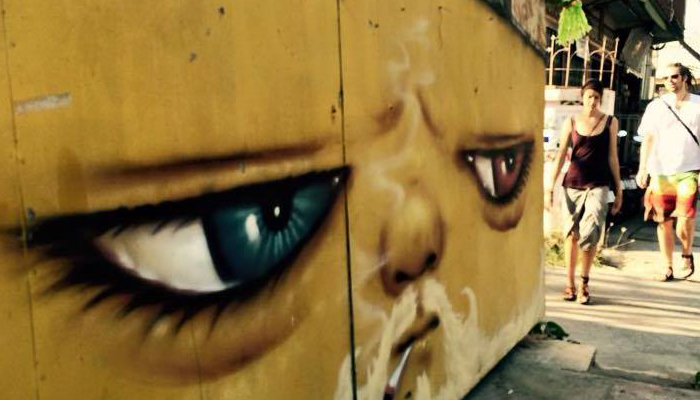My mother has come back from a trip to New Orleans and given me a piece of gris gris, a little piece of voodoo. It’s a little blue bag, big enough to hold a large olive, tied at the top with a black string. It smells faintly of men’s deodorant. I understand that it’s meant as a piece of touristy kitch, but I can’t help wanting it to be more than that.
The gris gris comes in a small ziplock bag that includes a small note indicating that this particular piece of gris girs is for “success, happiness, and good health.” It has been prepared by the one and only Dr. John T. Martin, who’s photo has been included in the Ziploc back. An older man, possibly in in his 60s with white hair peers from behind oversized glasses like a stern middle school vice principle. In the photo, he’s wrapped a snake around his shoulders and waist. It is a very large snake, holding him looks uncomfortable. Also the photo is small, so it’s hard to tell where the snake ends.
Dr. Martin seems both terrifying and ridiculous. I imagine that he’s done the photo shoot all by himself with a tripod and a timer on the camera. He spent the afternoon with a set up in his living room or maybe he has a voodoo studio. From the look on his face he is either deadly serious or this is a complete joke that he plays up for tourists. I’m worried that I cannot tell the difference.The instructions go on: “The gris gris (mojo) bag invokes the spirit of Yemaya who is the Goddess of the Sea and protector of the home. She brings success, happiness, and good health. Men carry the bag in the right pocket. Women in the left pocket or purse. You may leave it under your pillow or hang it as a ju-ju.” I think it would be great to get a little success, happiness, and good health in my life. I don’t feel that I’m particularly lacking, but a little extra would be nice. This probably makes me greedy, but I’m not sure that there is a Salvation Army for mojo. So, I’m trying to find a way to incorporate the gris gris into my life. Right now it is sitting next to my computer on top of my manuscript. If anything needs a little good health it’s my manuscript.
I’m worried I am not doing this mojo thing right. This is ridiculous for a couple of reasons. The first: there doesn’t really seem to be a way to do it wrong. The instructions are pretty damn simple, carry it around or hang it. I’m probably not far off. What happens if I hang it as ju-ju? Is that just good vibes? Does it lose specific power for “success, happiness, and good health?” I’m pretty sure that I’d prefer to have those three things rather than the vague “good ju-ju.” Ju-ju sounds like a gobstopper flavour. And I usually wear dresses and am generally without real pockets. Can I only carry it with pants? I guess I could put it in my bag, but I carry a very big bag, and the gris gris is very likely to get crushed like a used Kleenex at the bottom of my purse. If I know anything, crushing gris gris is not appropriate.Does all of this over thinking mean I could be doing it wrong? Really are you supposed to Google gris gris? Intuitively that seems incorrect in just the way that it seems unreasonable to Google “belief in God” and expect a satisfying answer. The collective crowd source of the Internet seems like the least likely place to find any religious meaning or belief.
The second reason is this: I’m not a believer. I feel awkward and disappointed in myself that I’ve become worried about these directions when I do not believe in any god or faith.
This lack of faith is a funny thing that has happened only in increments, but really I started not believing when I started to study writing. I learned the mechanics of storytelling. Mentors and teachers and peers showed me how all the little gears worked together. Take a good look at narrative structure and you’ll notice how religious stories are built on the same frame as any other story. It’s the same house, only with different decorations. The story of Cinderella is built on the same arch as Christian martyrs. The story of Jesus is that of Don Quixote. It’s two men on a quest trying to right all the wrongs and convincing people to believe in something that is so clearly unbelievable. Both stories keep you in doubt until the very end when the hero dies and leaves you a believer.
I’ve seen the trap doors and the smoke and mirrors. I can chat with literary friends about Susie’s use of first person narrative and Jimmy’s heavy-handed archetypes. It’s becoming rare that I just sit back and enjoy the show, and for the most part it’s fine. I like studying stories and figuring out how they work. Once you know the way it works, once you know that the story of gris gris is what makes it powerful, it loses some of it’s appeal.
For a long time I’ve just enjoyed that different kind of pleasure from stories. Like when you come across a great sentence or look at a masterfully constructed plot. I can still remember the pleasure of reading Light in August, “memory believes before knowing remembers,” and feeling like I’d been sucker punched. It’s pretty great when you can see how it all works.
I know how the story works, but there is this thing inside me that keeps me from tossing the gris gris in my bag where it will certainly get crushed down to a gritty mess. There is a piece of me that doesn’t really understand what in the world Faulkner was trying to say about memories. There is a piece of me that really hopes that Dr. Martin isn’t just playing it up for tourists. I want him to cherish each little blue bag of gris gris and believe in it.
I do not believe that the gris gris has any magical powers, and I treat it like it does. I want the gris gris to work, and I’m not comfortable with what it means if it does.
The best stories allow for both doubt and belief. A story becomes more than the mechanics that hold it together. All the pieces are worth understanding and examining, but when a story reaches its fullest potential, it translates a human truth. It says something about our ability to hate or to love. A story shows us how fragile or resilient we are. Narrative (I mean the collection of plot, character, voice, point of view, and structure) holds it all together and then, at some point, the parts become more than themselves. The way the pieces come together is its own magical alchemy.
Stories, the way that they work, help us to hold these contradictory things in our hearts and brains.
I do love this. I love that stories do this. I love that we contain these strange thoughts and feelings that rattle about like bumper cars. We all contain so many contradictions that it’s impossible not to stumble all over ourselves. We are with Don Quixote on his quest, cheering him on and betting against him. We are in awe and terror of Ahab. We find we are almost convinced of Humbert Humbert’s innocence though he is such an obvious maniac.
I’ve been moving my little bag of gris gris around my desk at work. I re-read a paragraph and move it to my right. I get up to get a glass of water and when I come back, I set it upon my computer. It’s a small bag of herbs, but it has a story. It’s been given a story of “success, happiness, and good health.” It has a magical story that Dr. Martin and his snake sell to tourists traveling to New Orleans in search of something to bring back to their relatives. There is a story about my mother who thought of me standing in a voodoo shop. There is a story about superstition and faith and reason.





